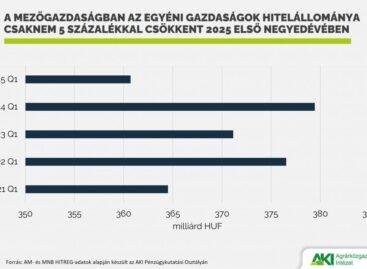The Hungarian farmers brought in the backwardness imposed on them by history
In ten years, Hungary and Hungarian farmers have almost made up for the backwardness that history imposed on them, and with further improvements in efficiency, domestic agriculture can be at the forefront of Europe, the Parliamentary State Secretary of the Ministry of Agriculture stated on Tuesday at the József Galamb Mezőgazdasági Technikum in Makó.

(Photo: AM/Tibor Vermes)
Sándor Farkas said at a conference presenting the training project in cooperation with Hungarian, Romanian and Serbian secondary and higher education institutions that, as a result of continuous improvements, agriculture produced 169 percent more new value per hectare in 2021 than in 2010 at the current price. He added: this is the second best result in the European Union, only Ireland surpasses Hungary. Even today, there are economies in Hungary that, in terms of their technological standards, compete with the top players in Western Europe, the politician said. Sándor Farkas said that agriculture is now high-tech: precision farming, automation, robotics, GNSS-based systems, self-propelled devices, and the use of drones are no longer just a visionary future, but an integral part of the agricultural present, and further development will also lead to digitization. Only with the help of digital solutions is it possible to increase the efficiency of production and at the same time pay attention to the values of our created world, to reduce the environmental burden, and to use resources rationally.
The Hungarian government is a committed supporter of farmers becoming increasingly familiar with and applying the advantages of digital technology
That is why the digital agricultural strategy was born in 2019, which has four main pillars: the development of digital competences, the digital “agricultural overhead reduction”, the development of the innovation environment, and the support of the digital transition of farmers, the politician said. 192.33 billion HUF was awarded to 2,634 positively evaluated applications in the Rural Development Program’s tenders supporting the digital transition and precision developments. From the HUF 119 billion paid out so far, the farmers were able to buy 6,000 modern tractors, 5,200 machines suitable for precision work and almost 1,300 combines – the state secretary explained the results. Speaking about the horticulture sector, Sándor Farkas explained that with the already closed and ongoing tender grants, the country will be richer with about 1.5 million square meters of new greenhouses and 900 thousand square meters of new foil-covered growing areas, and 5 thousand hectares of new fruit plantations can be established. As he said, horticulture is known to be a labor intensive sector, and mechanization, robotics, the spread of automation and precision farming can be the solution to the emerging labor shortage. In the Rural Development Program, the machine park can be expanded with 20,000 devices – harvesting and power machines, as well as tractors – across the country.
The state secretary emphasized the importance of creating professional supply
According to him, the task is not an easy one, as the rapid pace of change in technology presents never-before-seen challenges to vocational training institutions. That is why the Hungarian government has developed a vocational training system based on cooperation and knowledge sharing, which is based on solid professional knowledge and the competencies expected by employers. This is also the case with the Erasmus+ project, which is taking place in cooperation with secondary and higher education institutions in Hungary, Romania and Serbia, and which aims to create high-quality teaching materials on the automation and remote control of greenhouses with the involvement of labor market participants, which will provide students with the knowledge necessary to apply the latest technologies. they can get into their possession – said the politician.
MTI
Related news
We have already announced a tender worth 1,500 billion forints for the development of agriculture
Within the framework of the Common Agricultural Policy Strategic Plan,…
Read more >Agricultural loans decreased by 6 percent
Agricultural loans decreased by 6.0 percent to HUF 1,001.2 billion…
Read more >Agriculture’s income-generating capacity may depend on irrigation
Europe is facing an increasingly significant water shortage, so agriculture’s…
Read more >Related news
Corporate leaders’ commitment to sustainability at record level
According to the latest data from the K&H Sustainability Index,…
Read more >FAO food price index rose slightly in June due to higher prices of meat, dairy products and vegetable oils
The Food and Agriculture Organization of the United Nations (FAO)…
Read more >What can cause the price of a wine to increase tenfold?
There are fewer of them worldwide than the number of…
Read more >






